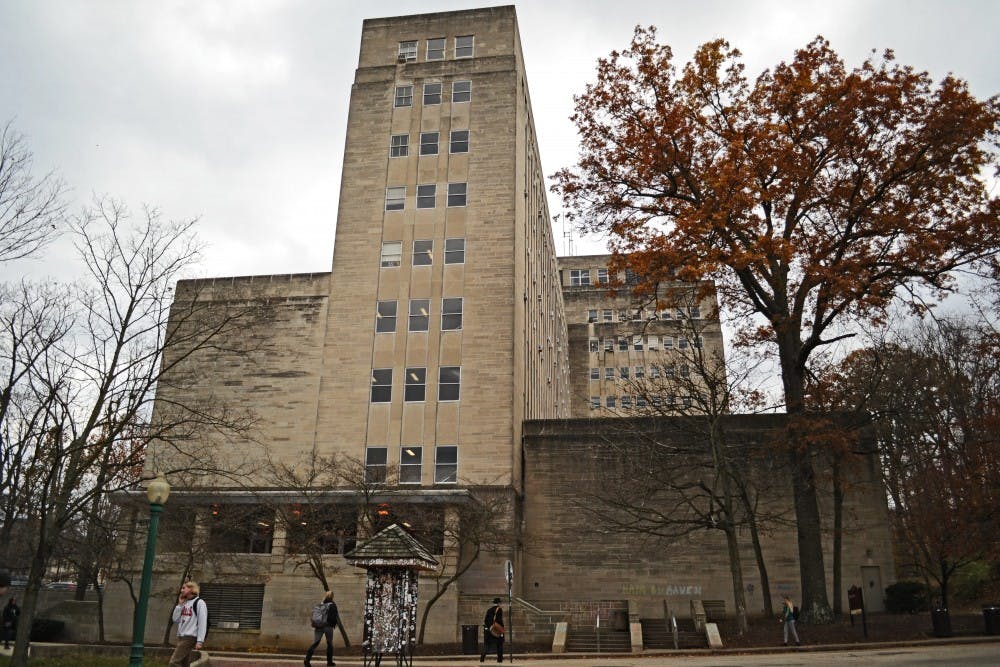Both students and professors may find their future class time in Ballantine Hall cut short due to upcoming renovations in fall 2018.
The renovations will take place in two stages over two years and will involve improvements to classrooms, heating, cooling, lighting, elevators, the roof, and electrical and fire protection.
Mark McConahay, the associate vice provost and registrar, said the renovation project is still in the early stages as IU works to accommodate classroom needs.
He said it is going to be challenging, but so far people have been supportive of the initiative. He asked people to continue to give the University some leeway when it comes to possible disruptions.
“Be patient with us,” McConahay said.
The Ballantine project is part of a larger scheme for renovating the entire Old Crescent, which encompasses a number of older buildings scattered throughout campus. Ballantine and the Geological Sciences building are both being renovated as the third phase of the Old Crescent Plan.
Tom Morrison, the Vice President for Capital Planning and Facilities, said in an email that the budget for phase three will total $78.5 million. Ballantine will receive the larger share of that fund, but exact budget figures have not been decided
The budget for phase two amounts to $48.5 million and aims to renovate Kirkwood Hall, Ernie Pyle Hall and Swain Hall. Phase one, which has been completed, involved renovations to Owen Hall and Franklin Hall, costing $23 million.
The total cost of these three project phases is $150 million.
Phase two projects should be almost finished by fall 2018, Morrison said. The estimated completion date for phase three is set for Jan. 15, 2020.
However, phase three is forcing professors to consider alternative classrooms and spaces outside Ballantine.
Professor Jane McLeod, chair for the Department of Sociology, said information is scarce. She said the renovations may cause a “major disruption” to classes and scheduling.
“The truth is we really know little,” McLeod said.
Ballantine has 77 classrooms and three auditoriums, amounting to approximately 25 percent of all classroom spaces on campus, according to an IU press release. More than 15 percent of all in-person campus classes meet in those Ballantine classrooms. Some classes will remain in Ballantine, and efforts will be made to minimize distractions and noise from the renovations, McConahay said.
Other classes will require replacement rooms to make up for the lost space, but right now those replacements, or “swing spaces,” are still fluctuating, McConahay said.
The lost space will shift classes normally taught in Ballantine to alternative locations, not all of which are decided yet, McConahay said. He explained the need for all the schools and departments to “give a little” to ensure that the actual room spaces are used efficiently.
“We’ve had to do this before, but not on this scale,” McConahay said.
McLeod said there will likely be classes taught in buildings that have never been taught in before, but little information has been disseminated on specific renovation plans.
McConahay confirmed and said the University was probably still making decisions on how to proceed with the renovations before releasing more information to the individual schools and departments.
While the University has not found all the necessary replacement rooms yet, there are some rooms already being prepared, according to the press release.
Those rooms include 14 classrooms in Lindley Hall, the former home for the School of Informatics, Engineering and Computing. The University is also working with individual schools and departments as well as Residential Programs and Services for scheduling available classrooms, McConahay said.
McLeod said notices have already started to circulate informing professors and faculty that there may be more conflicts than usual when assigning rooms in fall 2018.
McConahay asked faculty and students to try and manage expectations. Some of the rooms available are not as conveniently located as Ballantine, but McConahay said they are still excellent facilities and IU will work to minimize disruptions as much as possible.
The exact nature of the room conflicts, according to the press release, will not be known until the first round of scheduling for fall 2018 is completed, which is expected to be around Feb. 1.



